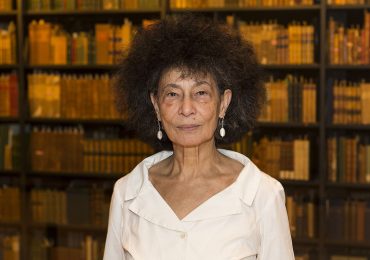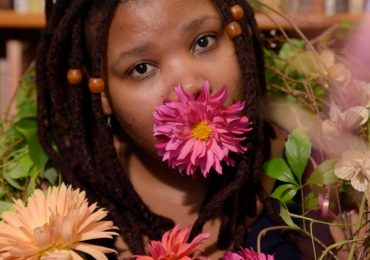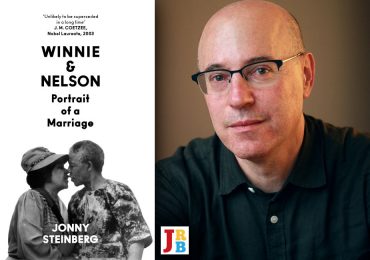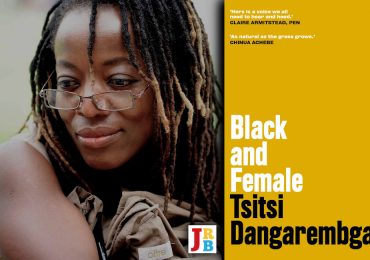Mapule Mohulatsi pays tribute to Toni Morrison, and weighs up the significance of her impact on and conversations with African writers.
Sentences. I love them for their grandeur. Like in mathematics, it is either the right sentence or it is not, and when it is, sweet Jesus. Oh, sweet Jesus. Sentences can break evenly, as two plus two can only equal four. Others creolise the even and break oddly, like one plus one can only equal two; and three plus three? Six. You see! It is in the same way the insane cannot lay claim to their insanity. Catch 22.
I was struck by my wordlessness at Toni Morrison’s death. By that evening, the condolences, love letters, testimonies, the works—all were flowing. Yet still, I had no words. A part of me thinks this is because I was jealous. I was jealous that Toni belonged to everyone. I was jealous that no one knew of the very personal relationship I had with her. I was also jealous that they were allowed to write about her. Despite my wordlessness, I wanted everyone to know how much I loved her, too. I loved especially her sentences, I wanted to say. When Beloved tells Paul D to touch me on the inside part and call me my name, who else could? When nuns go by as quiet as lust, and drunken men with sober eyes sing in the lobby of the Greek hotel, the Bluest Eye opens. And in the midst of despair don’t we all remember that if you wanna fly, you got to give up the shit that weighs you down—? Toni made the right sentences. Those hard-hitting sit-down-and-catch-yourself sentences, those ones, ja, that make you put the book down and, phew! Breathe child. Yes, uh-huh, those ones.
So, now that my jealousy has abated, Toni, I am writing the most reckless essay of my entire life, to you, from the pit of Africa. I dreamt of you once, which can only confirm that this essay marks a spiritual moment. Yes ma’am. Even in your aftermath your ghostly presence hovers, like a sentient mist, spirit mother. I may have teared up a bit before writing this.
Toni, I want, and perhaps more importantly need, to thank you for the three sentence-mothers you have left me with: Zoë. Marlene. And Yvonne. You have read Marlene, your endorsement appears on the cover of her novel Agaat (it’s good, right!?) and you may have read Zoë. Well, I hope so. She wrote a novel, Playing in the Light, writing back to your book of essays, Playing in the Dark. I am not sure if you ever met Yvonne, but Yvonne Vera is your sentence-child, Toni, she splits them apart as Mugabe tore Zimbabwe to shreds. To pieces. When she wrote Under the Tongue I am convinced that your Beloved was the soothsayer whispering divine prophecies into her pen. These three women do it like you, they do it with you: they write on issues of race, love, the human; they engage the literary imagination not only with beautiful sentences, but also with confrontation, and truth.
Toni, there has been so much attention given to your influence on global writing cultures, yet still I see an oversight. That is: a lack of acknowledgement of your impact on and conversations with African writing, especially here, in Southern Africa. I have listened to your interviews with, and admired the ways you spoke of, Chinua Achebe, Bessie Head and Léopold Sédar Senghor. But I am afraid the particular attention you paid to African literature(s) has been overlooked. I remember I picked up Agaat at a bookstore in Melville, Johannesburg, when I saw your cover shout: ‘I was immediately mesmerised … Its beauty matches its depth and her achievement is as brilliant as it is haunting’. When I read that shout, I wanted to go through what you felt. I was young and excited to know that you read our books too—and not only read, but also critically engaged with them. For me, your shout took you out of the American-Nobel-Prize-winning-novelist-Miss-Toni-Herself domain and brought you into my world, this world right here, in Melville. And Marlene was going to take us through her story and we would both be mesmerised, you and I, and at some point I could say, ‘You know, Toni, you might have been wrong about the depth, I mean, Marlene is after all a white South African and might be pulling a William Styron’ (which she is not), or, ‘Toni, you are so right! It’s brilliant, and haunting’. I felt that we had something new to speak about, you and I. But yes, Agaat is heavy. Set in apartheid South Africa, it portrays the intimate lives of two women, Mila, a sixty-seven-year-old white woman, and her black caretaker, Agaat. The prose takes us through flashbacks and the diary entries of Mila, a woman bent by motor neuron disease, unrequited love and a country at a turning point in history. We see the Cape countryside and the haunting love-hate relationship between the two women—maidservant and mistress, saviour and killer, mother and daughter. ‘Agaat’ is the Afrikaans word for ‘agate’, a precious stone said to cleanse the aura and eliminate negativity. Agate soothes and calms. Ha! Not Van Niekerk’s agate. Like many broken women that you have written about, Toni, Agaat sits at the edge of love, hate, redemption and revenge. She sits, like Pecola’s mother Mrs Breedlove, inside her own ugliness and dwells in it, like an ogre possessed by its reflection in the pond of self. She believes in her ugliness. She knows it. She loves it, even. For Agaat, her ugliness is her blackness, a blackness of skin and of heart that has set her apart from her white ‘family’ and the other farmworkers, who despise her for her elevated house-negress status. Agaat’s ugliness, much like Pauline Breedlove’s foot, is also encapsulated in her stunted hand, a deformity that unleashes a monstrous nastiness in her. Agaat is the novel’s first victim. She was adopted as a do-gooding project of a younger, more generous Mila—as something close to a daughter—then later discarded to become the help when Mila had her son, Jakkie. We are never sure if Agaat’s victimhood is enough to cover her monstrosities.
‘Agaat’ also translates to the Greek ‘Agatha’, which means ‘good’. Mila believes that ‘if you name things you have power over them’, but Agaat’s morality in the novel is no simple matter, especially where the moribund Mila is concerned. As in many of your novels, Toni, it’s not easy to draw the line between the end of evil and the beginning of good. For Van Niekerk, good and evil sit side by side, they creolise, haphazardly, until eventually both Mila and Agaat are each other’s good, each other’s evil. In the novel Mila cannot speak, except with her eyes and by writing down what she can manage. Agaat uses this to taunt her; for Agaat the matter of her blackness has unlanguaged her, for Mila it is her disease. The whole novel, then, becomes the construction of sentences: what is intended, what is said, what is not heard, and what is seen. The sentences run into each other, they fade, mask themselves, develop and then stop. The whole book is a moving poem.
Many have called you a poet too, Toni. How does it feel? You have written about and for black women, nurtured and nursed writers, some that you edited and others who grew from reading you, you have kept many writing woman friends. How does it feel?
Now that I have begun writing, there are too many words. Too many words for you. Your death has become a celebration of sorts, but I do not think any of us have the capacity to eulogise you. I will not try too hard. But I must be thankful. I must.
David needs a woman to hear him out. He needs a woman to unravel a complex set of histories, formed in the heat of the apartheid struggle, simply because he has no idea what being a Coloured person of Griqua descent means. David’s Story, we are warned from the preface, is not David’s story. Zoë is his amanuensis, but he insists that her opinion does not matter either. Let truth be left to its own devices. Ah! Let truth be left to its own devices, in our New South Africa. Toni, when I read Paradise I was enraptured by your study of new beginnings and how easily they become sites of utopian fantasy. But new beginnings can also be violent fantasies—when those men shoot the white girl first in Paradise, it’s as if they have to shoot her first, as if her whiteness is the first marker that their small black town is no longer in the thrall of that first flight of fantasy. In your Paradise, new beginnings and truth are built on righteousness, rigid prayer, and enforced moral law.
For Zoë Wicomb’s character David it is almost the same. But his story becomes lost in ambiguities, and it is dappled by the shadows of women, as are most men’s stories. Having left his wife and children in Cape Town, to search for his roots in Kokstad, David unravels his fascinating family tree, which amounts to a kind of mapping of the New South Africa. But his story is disarrayed and fragmented, it is historical and ahistorical; timelines are made, unmade and then remade. The novel is a gentle reminder that newness and truth have a way of remembering the past, they call for constant revision; it was like this before and now it is no longer like that, but it is still the same thing, just different. Wicomb does that with her sentences:
Ouma Sarie has hobbled down the hill bold as you please, smiling to herself at her own boldness, but the world had changed, it was mos the New South Africa, and she’d just ask, just say plainly, Listen, I hear you people put in a new foyer, jazzed up the whole place, as the children used to say, and I’ve come to have a look. This is also my place: for fifty years I worked here in this grand Logan Hotel, and the old Farquhars will tell you there was no better worker in all those years, not a single day off and all the girls under me just so sharp-sharp.
Here, Wicomb mixes pasts with current futures. This is also my place, her Ouma Sarie reminds us. Yes, history can and should be meddled with. I think that is the pertinent lesson I learnt from you and Zoë, that history is also our place. Writing is also our place. And in our place we can meddle and shift and question and rework and learn. You were right, Toni, for a woman to say she is a writer is difficult. Hence she needs her sentences. She must love her sentences. She must work on them. Even if it is to better a story that we are told is not ours to tell. So it is good that Zoë is David’s amanuensis, and even if he casts her opinion as an obstruction to truth, through her sentences she lets truth be left to its own devices. She tells his story, but his story is not his alone, there are others, too. She tells David’s story, which is not really his. History.
Vera was right, one can always be swallowed by a song. Toni, you speak of ‘freeing language from its sometimes sinister, frequently lazy, almost always predictable employment of racially informed and determined chains’. For you, language always bends into music, metamorphosing into something beyond the restrictive modes it’s usually to be found in. Your writing, and you say this yourself, is ‘an effort to be like something that has probably only been fully expressed in black music’. When Yvonne Vera opens her Butterfly Burning, the novella that introduced her to an American audience, black men bend their backs in the sun and hum a tune, and fume, and lullaby. Vera brilliantly evokes the black township of Bulawayo, Makokoba, through her poetic articulation of black life and its layered language:
Dying in your sleep. Not once, but several times. Fleeing from an image reflected from translucent shop windows. And then, again, sleep. Afterward, a brief resolve not to bend. Then saying yes.
Kwela strips you naked.
Kwela is a pennywhistle-based street music from southern Africa. It is jazzy, it is distinctive. The pennywhistle is cheap, it is portable. To ‘kwela’ is also to climb onto, to mount, and also to dance. And Vera does exactly that. When I read Vera I see the value of self invention. Like you, Toni, Vera invented herself through language. With her prose, she painted portraits of women and black life, and, like you, she is self conscious and always aware of how she paints. You can always sense a writer’s awareness from the page. It is not a bad thing. It is equanimity. And that is important because to be woman and writer is difficult. Kwela is also a warning that police vans, known as kwela-kwela (from the ‘climb on’ command the police give those they’ve arrested), are coming. One needs to dance, but also to watch out. Kwela, to dance, but also to watch out. Yes, it is difficult to be a woman and a writer, but it is more difficult to be a woman and a good writer. You have to dance, and you have to watch out.
Toni, I now think of you as Baby Suggs. Your writing is a clearing and you have taught us to love our flesh. You have called us to dance. And we have danced, and will continue to dance and must dance and will dance, and to dance is to write is to love is to see is to be …
I must be thankful. I must.
- Mapule Mohulatsi is a reader and writer from Johannesburg. She is currently undertaking a PhD in Oceanic Humanities, via African Literature, at Wits University. Her children’s book Miss President was published in 2018 through Everychild Books. Follow her on Twitter.






Dear Mapule Mohulatsi, could you please e-mail me (lewiss@cofc.edu) a brief bio note so that I can introduce you properly at the ALA conference later this month? Thank you. Simon Lewis. Charleston, SC, USA